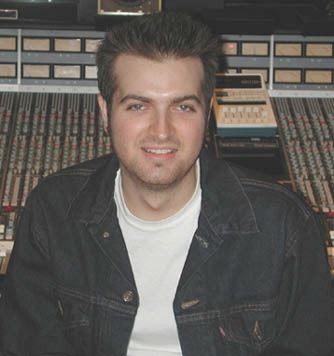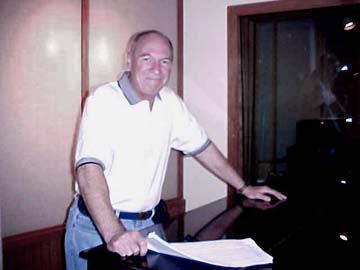Earthworks Gear A Hit At CRAS

Eric Blackmer of Earthworks recently visited the the Conservatory to discuss the finer points of audio and how Earthworks gear faithfully delivers pristine signal path. Eric's visit included an in-depth discussion of how human hearing works, the history of recording and the role of transducers in the audio chain. After the lecture was a demonstration of the new Earthworks Sigma 6.2 monitors. AES Student Section Chairman Seth Dockstader observed, "The CRAS Student AES Section was honored to have Eric Blackmer come speak and demonstrate Earthworks gear. We all enthusiastically discussed the demo and the topics that Eric talked about for several days after his visit." Blackmer's visit was part of the Conservatory's ongoing guest-lecture program. Recent lecturers have included; Mr. Rupert Neve, EveAnna Manley, Mike Sokol and engineer Mike Farrow.
Grad Lad Scores Big Gig

Mario McNulty's dream was to work with his musical hero David Bowie. Guess where he is now?
Age: 23
Hometown: Phoenix, AZ
Last School attended: The University of Arizona
Last Book Read: Noam Chomsky, 9-11
Favorite CD: Too many favorites! Some of my favorite artists include David Bowie, Peter Gabriel, Brian Eno, Tool, Frank Zappa, Led Zeppelin. The disc currently in my CD player is Spooky Ghost, by Gerry Leonard.
What got you interested in becoming a recording engineer?
Working in a studio has always been kind of a dream for me. First I wanted to be a studio musician, then I took a class on digital recording and found it fascinating. I would record bands I was playing in, or just record my friends that were in bands. I started to have a genuine interest in studio production. Becoming a studio musician just didn't seem realistic, so I shifted my focus. I love listening to a piece of music deeply, trying to listen to each instrument by itself. I am always amazed at certain sounds I hear on my favorite recordings, I want to shape and create that magic.
How did you find out about the Conservatory and why did you choose it over other schools?
I found out about the Conservatory through the internet. I was researching recording schools, and CRAS seemed to be the ideal fit for me. CRAS offered everything I wanted, and the internship program was the icing on the cake.
What do you most value about your CRAS education?
I value the overall capacity of knowledge, and the professional staff. The CRAS education, and determination are what helped me to be where I am at now.
You were fortunate in your experience after you left the school, tell us a bit about what led you to work with David Bowie.
I wanted to someday work with my musical hero, David Bowie. So I pursued an internship at the studio where David was rumored to record. It worked out very well! Tony Visconti, who is David's long time producer, works full time out of studio B at Looking Glass in New York City. I was fortunate enough to get to know David and Tony, and both have been very good to me since I have come to New York. I hope to continue my relationship with David and Tony, one day I would love be involved full time on a Bowie project.
What are your duties at the studio?
I am an assistant engineer at Looking Glass studios. I am working full time right now on a few different projects for composer Philip Glass. Philip owns Looking Glass, so many of the projects going on at the studio are Philip Glass related. This is a great experience because I am working with producer Michael Riesman and engineer Hector Castillo. I am always learning from them both, and it is a great experience. Michael is an expert in so many aspects of engineering, that I seem to learn an enormous amount from him on a daily basis. Because of the multiple projects going on at once, I pretty much stay "on call" 24/7.
What do you enjoy most about what you're doing now?
I am enjoying so much of my job. I think what I enjoy most is seeing an artist create, and then watching what becomes of it with our current technology.
How do you like working and living in New York? What was your experience during the September 11 attacks?
I love working and living in New York. Manhattan just has so much to offer, and working here is unique from anywhere else. The 9/11 attacks changed everything. I had only moved to New York City one week before, and my second day at the studio was the day of the attacks. It was a surreal time, and watching what happened with my own eyes was a lot to bear. I hope to never experience that again.
What's in your future? Do you have any career plans?
Hopefully I will continue to work in music production, that is my career plan!
Where do you see yourself in 5 years?
Maybe I will still be in New York, I have no idea - I try not to think that far ahead. Maybe in 5 years, humans will have digital inputs in the back of their heads -- who knows!!!
If you could give upcoming students just one piece of advice, what would you tell them?
Always stay humble, work hard, and treat people well. Remember, it isn't always about how good you think you are, or how much you know.
Instructor Profile: John Berry

Learning how to survive and prosper in the audio/music industry is an important part of the training that students receive at the Conservatory of Recording Arts. We recently talked with Music Business Instructor John Berry, an industry professional himself, about what students can expect to learn from his classes.
What do you teach at the Conservatory?
The general heading is Music Business which includes: copyright, contracts, publishing and how to make money and avoid being cheated.
Tell us about your musical background.
I am the composer/arranger of several thousand works (mostly for Jazz Band), about 500 of which are published. I'm also a former member of the U.S. Army Jazz Ambassadors where I was chief arranger, assistant director and bass trombonist.
Where did you learn your skills as a musician and arranger?
I learned to write by writing, writing and writing some more. I started out by doing record transcriptions of dozens of Stan Kenton orchestra tunes. I learned to play my vile, evil bass trombone (the instrument with which I offended an entire nation) at Indiana University and privately studied with two lower brass players in the Chicago Symphony.
How long have you been an instructor at the Conservatory and what got you started in audio education?
I started about 10 years ago as a substitute teacher and it evolved into a full-time gig. I have always had my own private MIDI studio, where I compose jingles and so forth. I got into sequencing and other technologies in the 80s and learned by doing and reading every manual cover to cover.
From your perspective, what is most interesting about the business side of the recording industry?
Right now, what's interesting is the great battle between the big labels and almost everyone else (Napster, other infringers, artists, equipment manufacturers, consumers, webcasters, individual businesses, etc.). I think it's heading toward a big revolution. This will escalate once consumers (and everyone else) finally get a belly full of the Labels' heavy-handed attempts to commandeer the tech world they totally ignored until a few short years ago. Beyond that, the day-to-day events in this industry are interesting – all the dangers the biz presents to anyone who doesn't know the biz.
What are some of the things a student can expect to learn from your classes?
That's simple – how to protect yourself in this very dangerous business. How to keep people from ripping off your songs (wouldn't it be awful if you wrote the number one hit song of all time, but you never earned a penny from it?), how to avoid being sued for a million dollars just because you didn't know what qualifies as illegal sampling, how to reap the rewards this business can offer without suffering the pains and losses that so many others have. Said another way, I pity the poor soul that goes into this industry without knowing how the business works!
Tell us more about what you do when you're not teaching at the school.
I still write some 12 tunes a year for Hal Leonard (mostly for jazz bands . . . at all levels), and beyond that, I relax on my "Ranch-ette" with my beautiful (and brainy) wife Robin and our menagerie – 3 horses, 1 burro, 2 dogs, 10 cats, and probably, a rattlesnake.




Visit the Headline Archive - See student and faculty profiles, facility spotlights, news and more.
Apply To The Conservatory Online - Our easy-to-use online admissions form makes it simple to get a Conservatory education.
|

